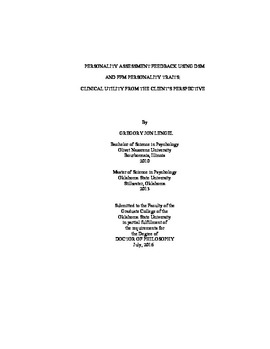| dc.contributor.advisor | Mullins-Sweatt, Stephanie N. | |
| dc.contributor.author | Lengel, Gregory | |
| dc.date.accessioned | 2017-02-22T22:09:58Z | |
| dc.date.available | 2017-02-22T22:09:58Z | |
| dc.date.issued | 2016-07 | |
| dc.identifier.uri | https://hdl.handle.net/11244/48835 | |
| dc.description.abstract | Clinical utility is an important issue in the diagnosis and treatment of DSM disorders. Several studies have examined the clinical utility of personality functioning utilizing clinician ratings. However, research examining the impact of these preferences on assessment or treatment is limited, despite the fact that client preference is a central component for evidence-based practice (APA, 2006). The current study examined the clinical utility of personality assessment from the client's perspective. In particular, the present study provides insight on what aspects of personality trait feedback clients find useful in understanding themselves and effectively addressing problems in living. The study also examined DSM-5 Section III Alternative Model of Personality Pathology (DSM-AM) and the Five Factor Model (FFM) to determine how these traits relate to important areas of impairment. Participants included treatment-seeking college students and Amazon.com MTurk community members who have recently or are currently seeking treatment (e.g., inpatient counseling, outpatient counseling, psychotropic medication). Participants completed measures of general and maladaptive personality and interpersonal, social, and psychological impairment. Upon completion, participants were provided with personalized feedback and asked to evaluate the results of each domain-specific component of their personality profile as well as the assessment feedback overall. Additionally, relationships between general and maladaptive personality traits with important areas of impairment were examined. Results suggest that providing explicit patient feedback on the traits of the DSM-AM and the FFM was rated favorably by participants. Results also suggest that traits accurately and comprehensively explained the characteristics and problem areas described by patients. The study also provides further support that these dimensional traits relate with relevant areas of impairment (i.e., personal distress, social, occupational). | |
| dc.format | application/pdf | |
| dc.language | en_US | |
| dc.rights | Copyright is held by the author who has granted the Oklahoma State University Library the non-exclusive right to share this material in its institutional repository. Contact Digital Library Services at lib-dls@okstate.edu or 405-744-9161 for the permission policy on the use, reproduction or distribution of this material. | |
| dc.title | Personality assessment feedback using DSM and FFM personality traits: Clinical utility from the client's perspective | |
| dc.contributor.committeeMember | Alderson, R. Matt | |
| dc.contributor.committeeMember | Leffingwell, Thad Ryan | |
| dc.contributor.committeeMember | Koch, Julie Mae | |
| osu.filename | Lengel_okstate_0664D_12677.pdf | |
| osu.accesstype | Open Access | |
| dc.type.genre | Dissertation | |
| dc.type.material | Text | |
| thesis.degree.discipline | Clinical Psychology | |
| thesis.degree.grantor | Oklahoma State University | |
